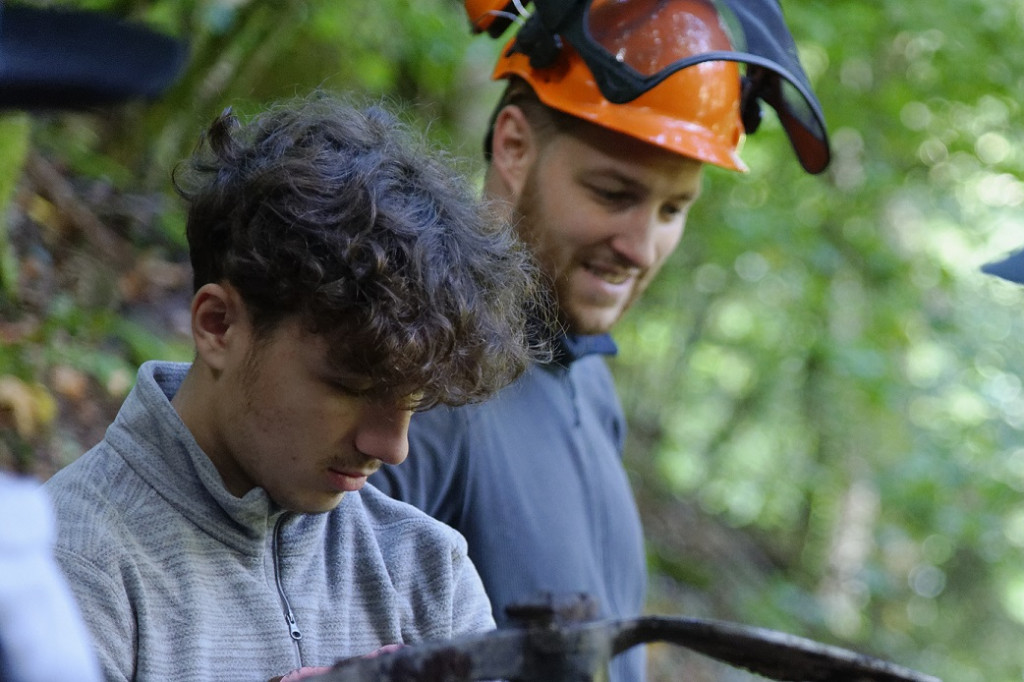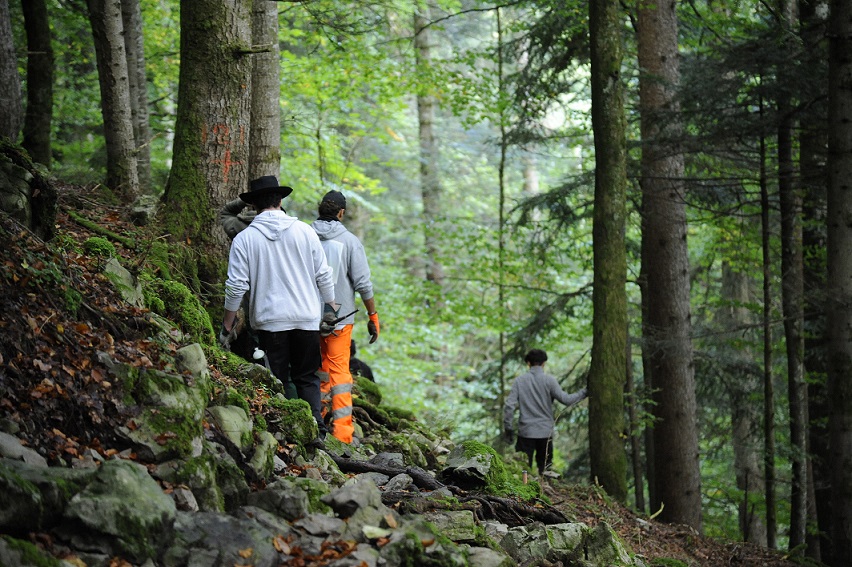A week in the forest thanks to Certas
09.11.2021At a crossroads near to the edge of the forest in Rossinière, a mountain village of the Vaud Pays-d’Enhaut, we are warmly welcomed by the managing director of the Bildungswerkstatt Bergwald Foundation. A good thing we packed our hiking shoes, “as the ascent to the work group in the forest will get dirty”, mentions Kaspar at the start of the trek towards the forest hillside. Our CEO Mr. Mock, Sabine Brechbühl and Claudia Masur visited the Foundation at work on 29 September, on a project with a 10th year school class of the ETML which was supported by a CHF 25,000 donation from Certas.
Holistic teaching in the mountain forest: Act – experience – understand
Mountain forests not only offer an important habitat for flora and fauna, but are also of major importance for us as humans. They protect us from natural hazards, regulate the climate and as a tourist attraction, are an important source of revenue of the mountain regions. During the ascent to the work group, we are made aware of the enormous challenge of working in the mountain forest.
“The hillside requires a lot of manual work”, Kaspar explains, and that makes the work performed by the work groups particularly valuable. This is because foresters today prefer to work with machines, the use of which is sometimes impossible on this type of slope.
Under the guidance of a forestry expert, paths are repaired, young forests cultivated, wildlife protection fences erected, trees felled, as well as bridges and walls built during the project weeks. The young people learn what kind of diverse manual work is necessary in the forest. The direct contact with this original habitat enables the participants to intensively tackle the topics of “sustainable development” as well as “thinking and acting responsibly”. “At the same time, they are confronted with challenging situations and pushed to their personal limits”, says Kaspar.
The week also offers the chance to reflect on and understand ecological and social relationships. The meaningful, unpretentious work in nature offers a valuable opportunity to escape from the sometimes over-intellectual daily routine. “The change of perspective in this unfamiliar environment aims to inspire and help the young people on their career path”, Kaspar adds. The objective is to stimulate ideas on the impact, consequences and risks of own actions and to gain understanding of the global context, the forest engineer continues.
Stronger as a team – without any words
Arriving at the group, we can see what kind of work is being carried out. “A tree trunk like this can weigh up to 150 kg”, explains Kaspar. Jeremie, one of the participants, remarks: “There’s much more teamwork required than I thought at first”. And the group already gets to work, without an exact allocation of tasks – everyone seems to know, without any words, where their place is to transport the tree trunk from A to B. After the 10th school year, Jeremie wants to do an apprenticeship as a carpenter. “I want to study wood technology later”, he adds. Despite maximum safety measures, minor injuries also occur from time to time in this physically very demanding work. “It’s just a small scratch”, says Julien, the budding computer scientist, and shows us the plaster on his thumb. Gabriel had expected the week to be less harsh and tells us proudly that he felled a tree by himself. “The work on the hillside is very strenuous, but at the same time it’s a lot of fun, and in the evening, I realise how hard I’ve been working during the day”, he grins.
Every day, a new task awaits the group. The instructions come from the group leader, who is actively involved, in the morning. Altogether, 22 pupils are working this week (only boys in this group), split up into four groups. At the beginning, some of the young people were a little sceptical – working outdoors in the dirt, wind and weather was a new experience for most of them, Kaspar tells us. However, this uncertainty usually disappears after one or two days.
The forest as a meeting place
We would love to join in ourselves, but our work in Zollikofen and Zurich is waiting. On the way down, Kaspar explains to us that the Foundation is increasingly bringing together German and French-Swiss youths, and also organises projects with refugees. The forest as a workplace serves as an informal meeting place. This forest project week thus not only establishes a closeness with nature and an awareness of the topic of sustainable development, but also promotes a socio-cultural exchange.

